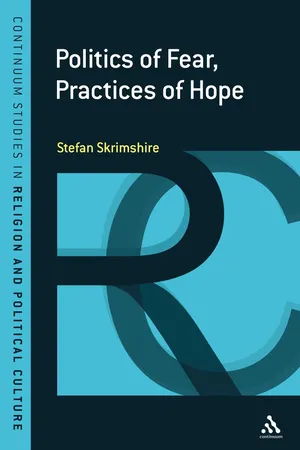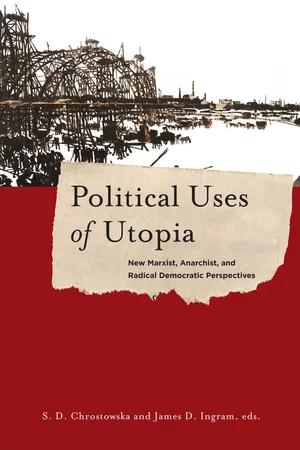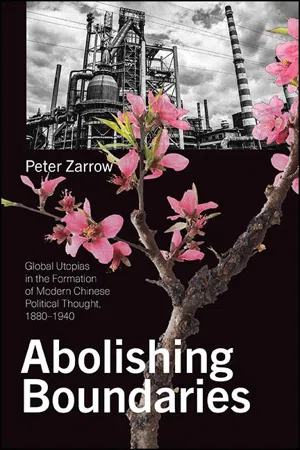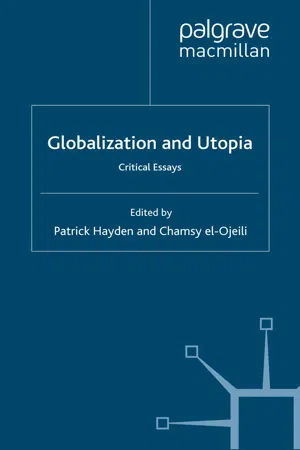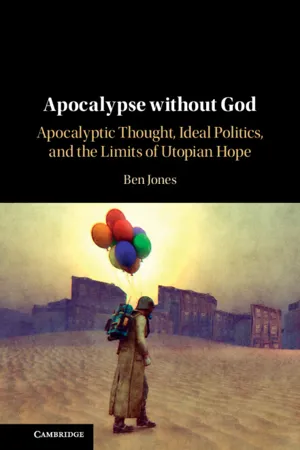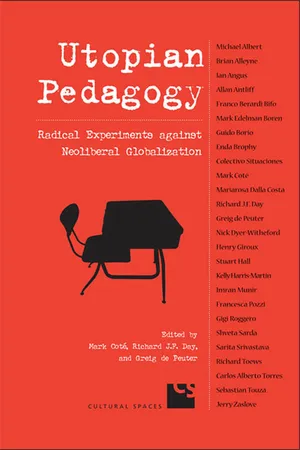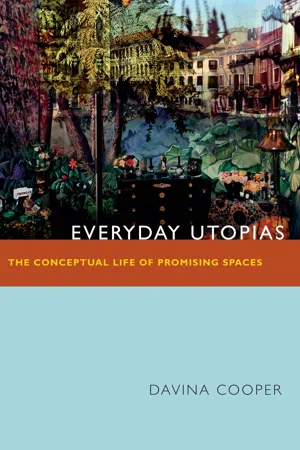Politics & International Relations
Utopianism
Utopianism refers to the belief in or pursuit of an ideal, perfect society. It often involves imagining and advocating for a future world without social, political, or economic problems. Utopianism can inspire social and political movements aimed at creating a better society, but it has also been criticized for being unrealistic and impractical.
Written by Perlego with AI-assistance
Related key terms
1 of 5
12 Key excerpts on "Utopianism"
- No longer available |Learn more
Utopia 1516-2016
More's Eccentric Essay and its Activist Aftermath
- Han Ruler, Giulia Sissa, Han van Ruler, Han van Ruler, Giulia Sissa(Authors)
- 2017(Publication Date)
- Amsterdam University Press(Publisher)
Utopianism and its discontents A conceptual history Julien Kloeg Abstract Utopianism is often rejected out of hand for one of two reasons: either it is thought to be politically dangerous, or it is thought to be a mere fantasy. It is nevertheless an important theme in contemporary political philosophy. This article reviews part of the political-philosophical career of ‘ utopia ’ as a concept by considering the different traditions that have been influential in shaping the way utopia and Utopianism are perceived today. A brief reading of Thomas More ’ s Utopia is followed by a consideration of the utopian socialist tradition and Karl Marx ’ s criticism of it. The Marxist understanding of utopia continued into the twentieth century. Utopianism ’ s bad reputation is partly due to its association with the attempt to realize communism in the Soviet Union, but other factors include the Eastonian empirical turn in political theory and the onset of postmodern incredulity. It made a perhaps surprising comeback in the work of John Rawls, whose work was recently criticized by Amartya Sen for being overly ‘ utopian ’ – a criticism that is highly analogous to Marx ’ s onslaught against the utopian socialists. With the help of counter-arguments devised by Pablo Gilabert, the article considers three ways in which Utopianism can be useful to contemporary political thought. Keywords: Utopianism, Thomas More, utopian socialism, distributive justice and utopia Introduction Every concept is controversial in academic philosophy, but some are more equal than others in this respect. Utopia and its twins ‘ utopian ’ and ‘ uto-pianism ’ have long been regarded with great suspicion. Leszek Kolakowski once said that the trouble with utopias is not that designing one is too hard, but rather that it is too easy. We can certainly sympathize with such worries. In the name of furthering the ideal society, many evils can appear permissible. - eBook - PDF
- Stefan Skrimshire(Author)
- 2008(Publication Date)
- Continuum(Publisher)
Today this controversy is most active where discussion of Utopianism becomes conflated with those concepts of the ‘perfect’, uncompromised society. Utopia is thus associated with a kind of ideological purism, or fundamentalism. ‘Anti-Utopianism’ seems to have emerged as a reaction to the failed Utopian experiments of the twentieth-century fascism and totalitarian communism. 2 Utopia as a political destination , and conceived originally by Thomas More as an imagi-nary state of (near) perfect society, appeared to many to represent some guide or blueprint to political ‘purification’. It was thus felt to say too much about what might be politically imaginable. John Gray has also renewed a critique of Utopian thought. For Gray, Utopianism represents that remnant of liberal thought that carried through the Judaeo-Christian obsession with the evolution of human progress. Utopianism in any of its many different political and religious hues was at best ridiculous, at worst, as dangerous as the renewed apocalyptic sensibilities of fundamentalist sects. But perhaps we can avoid some easy misunderstandings here by stressing the divergence between constructed or attempted Utopias and Utopianism. Since Thomas More’s opening of the ‘generic window’, in fact, Jameson traces a split between the imagined realization of Utopia and the more ambiguous Utopianism as an omnipresent ‘impulse’. 3 For it is within the 2 See Stefan Skrimshire, ‘What Is an Anti-Utopian? Gray, Jacoby, Jameson’ forth-coming in Cultural Politics: An International Journal , vol. 4, no. 2 (July 2008), 231–247. 3 Jameson, Archaeologies of the Future , p. 3. - eBook - ePub
Political Uses of Utopia
New Marxist, Anarchist, and Radical Democratic Perspectives
- S. D. Chrostowska, James D. Ingram, S. Chrostowska, James Ingram(Authors)
- 2017(Publication Date)
- Columbia University Press(Publisher)
32 The time, in short, is ripe to reopen utopia as a political question. But for this discussion to be fruitful, it must be conducted on new bases, beyond the impasses and static oppositions outlined above.As the postwar antiutopians recognized, a recipe-book conception of the relation between theory and practice, between the ideal and the real, is as unrealistic as it is dangerous. It ignores the fact that politics is perhaps uniquely subject to the law of unintended consequences—that, as Hannah Arendt noted, since it always and only deals with people in the plural, it can never imagine them being subjected to a single dream or vision. The common starting point of the contributions to this volume is dissatisfaction with how the relationship between utopia and politics has for generations been framed—namely, by the assumption that utopia must be viewed either as a political ideal that is impossible to realize by definition, and therefore a mere thought experiment, or as something achievable, a model or blueprint. All our authors agree that neither of these models will do and that the political uses of utopia lie, if anywhere, between—or, better, are something other than—these alternatives. Moreover, although they reflect in different ways on the grand tradition of Western Utopianism, they are interested less in the tradition per se than in its relevance and specific valences within the current situation.Utopia as discussed here is always utopia that presupposes plurality and contingency. This observation extends, moreover, beyond textual utopias to their really existing, practical-experimental counterparts (Sargent’s second, “communitarian” face of utopia). Unlike the classic “intentional communities” from Fourier’s phalanstères to Owen’s New Lanark to the communes built to preserve the spirit of ’68, the prefigurative Utopianism associated with contemporary anarchism and the recent Occupy movement, mentioned here by Michaël Löwy and explored by Ruth Kinna, is acutely aware of the danger of reifying rationalistic, unlivable designs. If anything, the utopias tentatively opened up by today’s radical activists are provisional and ephemeral to a fault—utopias of practice, not planning.33 - eBook - ePub
Abolishing Boundaries
Global Utopias in the Formation of Modern Chinese Political Thought, 1880–1940
- Peter Zarrow(Author)
- 2021(Publication Date)
- SUNY Press(Publisher)
Utopianism in the sense I use it here is an optimistic form of egalitarian and cosmopolitan humanism. It is a product of the Enlightenment and modernity. By “humanism” I simply mean an abiding concern with the well-being of humankind as a whole: a sense that all individuals matter and possess dignity and agency. 4 By describing the humanism of modern Chinese thinkers as “cosmopolitan” I do not merely mean to heighten their humanism but also to highlight their engagement with the world: their search for universal truths in a newly interconnected world. At the same time, the Chinese thinkers considered in this book remained deeply commited to the regeneration of China. Indeed, they helped create modern Chinese nationalism. A certain tension arises between cosmopolitan engagement with the world and commitment to nationalism. Yet as Joachim Kurtz notes, “At the same time, this engagement, in line with global trends, became enmeshed with a decidedly nationalist agenda.” 5 Utopian thinkers could reconcile these tensions by looking toward a future where the mutual enmity of nations gave way to a moral world order. Cosmopolitanism thus involved both engagement in the present and a vision of a borderless future. I also take “Utopianism” to refer to a secular belief in the perfectibility (or near-perfectibility) of the world based on respect for human dignity and communitas. I acknowledge that there is much that is arbitrary about this definition. 6 Utopianism in this sense is not concerned firstly with individuals: it is a social vision. Furthermore, the utopian social vision is not mere belief that things can get better but a leap of faith that all the evils of this world can be abolished. Utopianism is thus distinguished from ordinary optimism or, for that matter, mere reformism by its conviction that the ideal future is not only achievable but is close to inevitable and pretty much around the corner - eBook - PDF
Utopian Horizons
Ideology, Politics, Literature
- Zsolt Cziganyik(Author)
- 2017(Publication Date)
- Central European University Press(Publisher)
4 Lyman Tower Sargent, Utopianism: A Very Short Introduction (Oxford: Oxford University Press, 2010), 5. This is the definition preferred by Sargent. 5 Ruth Levitas, The Concept of Utopia (Syracuse, NY: Syracuse University Press, 1990), 7. 43 When Does Utopianism Produce Dystopia? good place. It thus means “impossible.” In particular, this implies that attempting grand schemes of social and political transformation that demand a substantial improvement in human behavior pushes humanity beyond the limits of its moral capability and is bound to result in failure, if not, when driven by revolutionary violence, complete catastrophe. If, in particular, utopia means the “perfect” society, it is by definition unrealiz-able. Thus Leszek Kołakowski tells us that “the idea of the perfect and everlasting human fraternity . . . is the common and permanent core of Utopian thinking.” 6 Juxtaposed to this view are a number of scholarly definitions. His-torically, besides the broad idea of any kind of imaginary or idealized society, utopia is often specifically associated with Plato, Sparta, and Thomas More, and with the themes of equality, communism, and what I have termed “enhanced sociability.” It has a bearing, in the interpreta-tion of David Wootton in particular, upon More’s interpretation of Aris-totle’s idea of friendship, filtered through Pythagoras as well as through More’s close friend Erasmus. 7 Historians stress, however, that while they exhibit many varied types with a bewildering array of themes juxtaposed within the genre, utopias do not usually portray a “perfect” society. J. C. Davis distinguishes utopia from the millennium, the perfect moral com-monwealth, and the imagery of the Land of Cockaigne and Arcadia. - eBook - PDF
Globalization and Utopia
Critical Essays
- P. Hayden, C. el-Ojeili, P. Hayden, C. el-Ojeili(Authors)
- 2009(Publication Date)
- Palgrave Macmillan(Publisher)
Human rights thus occupy a special position at the international level, inasmuch as they serve as the enabling conditions upon which postnational democracies can be legitimated. Generally speaking, I contend that three potential utopian impulses may be adopted in light of the crisis of nation-state legitimacy today . 64 Globalization and Utopianism: Theoretical Connections A ‘nostalgic’ Utopianism would seek either the protectionist closing of the state as advocated by neonationalists or the free-market opening of borders to economic self-regulation as advocated by neoliberals. An ‘ide- alist’ Utopianism would advocate the complete elimination of states and borders, and the formation of a world community or government liber- ated from all sub-global forms of partialistic community and national culture. A third option, which can be found in Habermas’s work, is for a reflexive Utopianism that combines the functional integra- tion of states and markets (system) with transnational social practices through political intervention of national and regional public spheres (lifeworld). The system performs the task of opening markets, legal sys- tems, and communication networks, thereby facilitating new ways of life that transcend national communities, while the lifeworld recon- structs identities, meanings, and practices that ground those new ways of life within democratic communities that regard themselves as mem- bers of enlarged, globally oriented communities of fate. This approach attempts to respond to the challenges of globalization by synthesiz- ing multiculturalism and individualization in a democratic civil society attuned to both differences and universalism. In attempting to trans- late this reflexive utopian vision into practice, Habermas argues that the process of European integration might serve as an example of cosmopolitanization. - eBook - PDF
No Other Planet
Utopian Visions for a Climate-Changed World
- Mathias Thaler(Author)
- 2022(Publication Date)
- Cambridge University Press(Publisher)
See: Geuss, “Realism and the Relativity of Judgement.” 24 Berlin, “The Pursuit of the Ideal.” 25 Shklar, After Utopia; Shklar, “The Political Theory of Utopia.” 26 Kolakowski, “The Death of Utopia Reconsidered.” 27 Kant, “Idea for a Universal History from a Cosmopolitan Perspective,” 9. 28 Cited in: Slezkine, The House of Government, 67. 2.1 THE CASE AGAINST Utopianism 59 It is Karl Popper who voiced the most stringent objection to this voracious view of the world. Popper’s critique is based on a peculiar epistemology that centres human fallibility. The following quotation summarizes this account: Since we cannot determine the ultimate ends of political actions scientific- ally, or by purely rational methods, differences of opinion concerning what the ideal state should be like cannot always be smoothed out by the method of argument. They will at least partly have the character of reli- gious differences. And there can be no tolerance between these different Utopian religions. Utopian aims are designed to serve as a basis for rational political action and discussion, and such action appears to be possible only if the aim is definitely decided upon. Thus the Utopianist must win over, or else crush, his Utopianist competitors who do not share his own Utopianism and who do no profess his own Utopianist religion. But he has to do more. He has to be very thorough in eliminating and stamping out all heretical competing views. For the way to the Utopian goal is long. 29 The main point here is that violence results directly from the perfect blueprint that Popper detects in all utopias. Because utopias hinge on the construction of an ideal state whose consolidation is projected into the future, they resort to social engineering, which is then justified by the goal of building a homogenous and conflict-free community. 30 Since it seeks to remove human fallibility, Utopianism is totalitarian in nature. - eBook - PDF
Apocalypse without God
Apocalyptic Thought, Ideal Politics, and the Limits of Utopian Hope
- Ben Jones(Author)
- 2022(Publication Date)
- Cambridge University Press(Publisher)
Utopian hope goes beyond desiring and believing in the possibility of justice in the short term, which even if realized can often be fleeting in the face of new political developments that threaten to overturn progress. Utopian hope sets its sights on a far loftier goal: a future that ultimately proves hospitable to justice and the ideal society. Ideal theory offers such hope to sustain people when the immediate prospects of justice seem bleak. Utopian hope offers psychological benefits and, understandably, some embrace it. For those who do so by turning to either religion or ideal theory, it is important to be honest that such beliefs rely on faith. The chapter closes with a look at Rawls’s writings to show that, though its role is often downplayed, faith has been an inextricable part of contemporary ideal theory from the start. Once we recognize that point, it becomes clear that political philosophy must rethink ideal theory’s role in advan- cing justice. IDEAL THEORY’S NORMATIVE APPEAL Before getting into ideal theory’s limitations, let’s first look at what draws people to it. Ideal theory takes different meanings, and here the focus is on 8 Rawls, The Law of Peoples, 128; Justice as Fairness, 37–38; and Political Liberalism, exp. ed. (New York: Columbia University Press, 2005), lx. See also Paul Weithman, Why Political Liberalism? On John Rawls’s Political Turn (New York: Oxford University Press, 2010), 367–69; Benjamin McKean, “Ideal Theory after Auschwitz? The Practical Uses and Ideological Abuses of Political Theory as Reconciliation,” Journal of Politics 79, no. 4 (2017): 1177–90; and Dana Howard, “The Scoundrel and the Visionary: On Reasonable Hope and the Possibility of a Just Future,” Journal of Political Philosophy 27, no. 3 (2019): 294–317. Ideal Theory as Faith 147 what I call navigational ideal theory. 9 This conception of ideal theory seeks to outline the best and most just society with the potential of being realized at some future point. - eBook - PDF
Utopian Pedagogy
Radical Experiments Against Neoliberal Globalization
- Mark Cote, Richard J.F. Day, Greig de Peuter(Authors)
- 2019(Publication Date)
- University of Toronto Press(Publisher)
A short answer is that we looked to utopia not as a place we might reach but as an ongoing process of becoming. More specifically, the utopia that runs through this collection is both a critical attitude to-wards the present and a political commitment to experiment in trans-figuring the coordinates of our historical moment. As is becoming increasingly clear, ‘the enemies within’ a social order of infinite war and 14 Mark Coté, Richard J.F. Day, and Greig de Peuter imminent threat – critical thinkers, educators, activists, builders – all share the common trait of proposing something other than a new Anglo-American world order, a beyond that exceeds not only this particular configuration, but also all possible particular configurations. Instead of accepting that the radical utopian imaginary is an anachro-nistic holdover from the glory days of revolutionary socialism, we would argue that utopian theory and practice acquire a new relevance as the hyperinclusive logic of neoliberalism compels us to take up positions that are intrinsically outside of and other than what is . The utopian impulse that interests us does not lead to a promised land. It knows that domination and exploitation can only be minimized, never eliminated; that struggle will persist; and that something like a state, like a corporation, like asymmetrical power relations in any form, will forever be trying to emerge from within and without our communities and will therefore need to be warded off. Also, it orients itself to the radical outside to such an extent that no blueprint could ever survive the passage from conception to implementation without becoming some-thing entirely other than what it was. Thus it might be said that utopian experiments today share a point of departure much more than a point of arrival. - eBook - PDF
Everyday Utopias
The Conceptual Life of Promising Spaces
- Davina Cooper(Author)
- 2014(Publication Date)
- Duke University Press Books(Publisher)
But how are we to build a conceptual framework adequate to the task? Starting with a commitment to another better way of living, utopian per-spectives emphasize the importance of “society imagined otherwise, rather than merely society imagined” (Levitas 2005: 14; Sargisson 2012). While utopian scholarship, as I have said, does not belabor the concep-tual character of normative terms, reimagining the practices and sys-tems to which such terms gesture is a central task. Fleshing out norma-tive terms, such as democracy and equality, by describing key features of the utopian landscape provides a degree of political (and so conceptual) specificity and closure; it is not change for its own sake that is desired and sought, but particular kinds of change. At the same time, developing concepts by means of establishing landscapes emphasizes the importance of location and happening. Innovations may not be practically realized, but even in storytelling or other art forms utopian perspectives depend upon some kind of (imagined) actualization (what Jameson [1977: 11] refers to as a “pre-conceptual thinking-in-images”).14 In this way utopias are fundamentally different from campaigns, argu-ments, or slogans that declare the change they wish to see. With their 34 CHAPTER 2 experiments and innovations in living (including in imagined experi-ments), utopias emphasize the importance of transformed social exis-tence to thinking differently. As a consequence, utopian texts and meth-ods also center ontological or human change. It is not simply about the creation of worlds or ways of living that will better meet people’s inter-ests as they currently are . Utopia is also centrally concerned with those changing interests, desires, identifications, and forms of embodiment that happen as people (and other forms of life) experience other ways of living (Levitas 2013). - eBook - ePub
Ameritopia
The Unmaking of America
- Mark R. Levin(Author)
- 2012(Publication Date)
- Threshold Editions(Publisher)
PART ION Utopianism
Passage contains an image
CHAPTER ONE
THE TYRANNY OF UTOPIA
TYRANNY, BROADLY DEFINED , is the use of power to dehumanize the individual and delegitimize his nature. Political Utopianism1 is tyranny disguised as a desirable, workable, and even paradisiacal governing ideology. There are, of course, unlimited utopian constructs, for the mind is capable of infinite fantasies. But there are common themes. The fantasies take the form of grand social plans or experiments, the impracticability and impossibility of which, in small ways and large, lead to the individual’s subjugation.Karl Popper, a philosopher who eloquently deconstructed the false assumptions and scientific claims of Utopianism, arguing it is totalitarian in form and substance, observed that “[a]ny social science which does not teach the impossibility of rational social construction is entirely blind to the most important facts of social life, and must overlook the only social laws of real validity and of real importance. Social sciences seeking to provide a background for social engineering cannot, therefore, be true descriptions of social facts. They are impossible in themselves.”2 Popper argued that unable to make detailed or precise sociological predictions, long-term forecasts of great sweep and significance not only are intended to compensate for Utopianism’s shortcomings but are the only forecasts it considers worth pursuing.3 (Although Popper differentiated between “piecemeal social engineering” and “utopian social engineering,” it is ahistorical, or at least a leap of faith, to suggest that once unleashed, the social engineers will not become addicted to their power; and Popper never could enunciate a practical solution.)Utopianism is irrational in theory and practice, for it ignores or attempts to control the planned and unplanned complexity of the individual, his nature, and mankind generally. It ignores, rejects, or perverts the teachings and knowledge that have come before—that is, man’s historical, cultural, and social experience and development. Indeed, Utopianism seeks to break what the hugely influential eighteenth-century British statesman and philosopher Edmund Burke argued was the societal continuum “between those who are living and those who are dead and those who are to be born.”4 Eric Hoffer, a social thinker renowned for his observations about fanaticism and mass movements, commented that “[f]or men to plunge headlong into an undertaking of vast change, they must be intensely discontented yet not destitute, and they must have the feeling that by the possession of some potent doctrine, infallible leader or some new technique they have access to a source of irresistible power. They must also have an extravagant conception of the prospects and potentialities of the future.… [T]hey must be wholly ignorant of the difficulties involved in their vast undertaking. Experience is a handicap.”5 - eBook - PDF
Rotten Foundations
The Conceptual Basis of the Marxist-Leninist Regimes of East Germany and Other Countries of the Soviet Bloc
- Peter W. Sperlich(Author)
- 2002(Publication Date)
- Praeger(Publisher)
Utopia and Religion 79 Totalitarian Utopianism Most Utopias are totalitarian in spirit. Most totalitarian systems include Utopian elements. Communism is a totalitarianism (see Chapter 6 for a discussion of totalitarianism) which not only includes Utopian components, but which, in the last analysis, is a Utopia. It clearly exhibits the defining elements of a Utopia, as these have been delineated by Dahrendorf [1968c, 108-110] and others: 2 no change (no past, no future, only a stable present); uniformity (universal consensus on ends and means); harmony (the system produces no non-conformists or deviants); deviance externality (non- conformists and deviants, if any, come from the outside); all processes fol- low recurrent patterns (they affirm and sustain the status quo); and comprehensive isolation from the outside (no travel into or out of the sys- tem by persons or ideas). The key element of Utopias is harmony—which is well reflected in com- munist notions, such as the classless society and the endless dialectical uni- ties. All Utopian political philosophies affirm the fundamental harmony of persons, otherwise Utopia would be troubled with the same intractable conflicts as the ex- isting world. But the totalitarian variant also emphasizes the identity of individual and collective purposes, promising that the moral purposes of individuals will be fulfilled as the purposes of the race, class, species, or history are achieved. The moral perfection of men is thus inextricably related to and made dependent on the perfection of society. [Kirkpatrick, 1983, 102] Totalitarian Utopianism is characterized above all by its unbounded will- ingness to use all available methods, including force, to increase the hap- piness and improve the morals of its citizens—proclaiming all the while that no one ever enjoyed more freedom.
Index pages curate the most relevant extracts from our library of academic textbooks. They’ve been created using an in-house natural language model (NLM), each adding context and meaning to key research topics.

